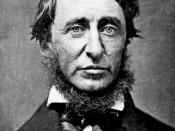The poets are dead; Transcendentalism lives on Most people look down upon Transcendentalism because they do not know what it means. Transcendentalism is a belief in a higher reality than that found in sense experience, or belief in a higher kind of knowledge than achieved by human reason. Transcendentalism revolves around the existence of absolute goodness, something beyond description and knowable, ultimately only through intuition. The term Transcendentalism became applied almost exclusively to doctrines of metaphysical idealism. In its most specific usage, Transcendentalism refers to a literary and philosophical movement that developed in the United States. Intuition rather than reason was regarded as the highest human faculty. It was believed in order to comprehend the divine, God, and the universe one must transcend or go beyond the physical and emotional description of normal human thought. Transcendentalism opposed the strict ritualism and dogmatic theology of established religious institutions. Transcendentalist writers expressed semi-religious feelings toward nature, as well as the creative process, believing that divinity permeated all objects.
Director Peter Weir illustrates that the movie Dead Poet's Society echoes Transcendentalist notions in content in that self-reliance and individualism must outweigh external authority and blind conformity to custom or tradition, intuition is superior to deliberate intellectualism and rationality and in structure through the idea that one can find truth and beauty in nature.
One of the main ideas of Transcendentalism is that one's own opinions should prevail over deliberate conformity. Emerson wrote concerning that notion saying, "Whoso would be a man, must be a nonconformist" ("Self-Reliance" 15). Emerson tightly relates one's being with nonconformity, therefore illustrating that one who does conform to society's wishes is less of a man, or yet a real man at all. Emerson takes off on that idea and goes on to express the bold statement, "Imitation is suicide"(3).


![[Portrait of Ralph Burns, Edwin A. Finckel, George Handy, Neal Hefti, Johnny Richards, and Eddie Sauter, Museum of Modern Art, New York, N.Y., ca. Mar. 1947] (LOC)](https://s.writework.com/uploads/3/39226/portrait-ralph-burns-edwin-finckel-george-handy-neal-hefti-thumb.jpg)